 The Book of Kimm
The Book of Kimm The Book of Kimm
The Book of Kimm
Justus Heinrich Kimm
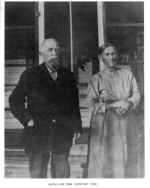 1.7 Justus Heinrich Kimm2 (also called Gus or G.H.) b 11 Sept 1839 village of
Sand province of Hesse Kassel Germany son of Jacob Conrad Kimml and Anna
Elizabeth Welner d 11 Sept 1931 Blairstown Ia bur Mound Cem Watkins Ia m 26 Dec
1866 Emma Schneider b 26 Feb 1850 Deaverstown Ohio dau of Gregory George
Schneider and Regina Rothenberger d 30 Oct 1932 Blairstown Ia bur Mound Cem
Watkins Ia
1.7 Justus Heinrich Kimm2 (also called Gus or G.H.) b 11 Sept 1839 village of
Sand province of Hesse Kassel Germany son of Jacob Conrad Kimml and Anna
Elizabeth Welner d 11 Sept 1931 Blairstown Ia bur Mound Cem Watkins Ia m 26 Dec
1866 Emma Schneider b 26 Feb 1850 Deaverstown Ohio dau of Gregory George
Schneider and Regina Rothenberger d 30 Oct 1932 Blairstown Ia bur Mound Cem
Watkins Ia
Children Kimm b near Atkins Benton Co Ia
1.7.1 Mayme Kimm3 b 12 Apr 1868
1.7.2 Laura Kimm3 b 12 July 1869
1.7.3 Emma Kimm3 b 27 Aug 1870
1.7.4 Charles Kimm3 b 6 Oct 1871
1.7.5 Henry Gus Kimm3 b 3 3an 1873
1.7.6 Ella Kimm3 b 4 Aug 1874
1.7.7 Alice Kimm3 b 22 Apr 1876
1.7.8 Gus Henry Kimm Jr3 b 7 Mar 1878
1.7.9 Arthur Allen Kimm3 b 27 July 1879
1.7.10 Abbie Kimm3 b 8 Feb 1881
1.7.11 Archie Kimm3 b 4 Mar 1883Children Kimm b near Blairstown Benton Co Ia
1.7.12 John Kimm3 b 24 Nov 1884
1.7.13 Thomas Mathew Kimm3 b 14 Oct 1886
1.7.14 Albert Kimm3 b 31 Aug 1888
1.7.15 Martin Kimm3 b 14 Oct 1890
1.7.16 Margaret (Maggie) Kimm3 b 9 Feb 1893
1.7.17 Dehlia Kimm3 b 1 June 1896 d 8 Mar 1901
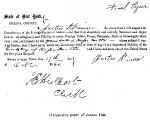 Justus Kimm immigrated to the United States in 1853 at the age of fourteen
with his brother, Silas, and his sister, Alice. They went to Cedarville, New
York in Herkimer County. Justus worked as a farm hand until he enlisted in the
Civil War after becoming a United States citizen in 1860. He enlisted in 1861 in
Company G, 34th Regiment, of the 2nd New York Volunteers under Col. James Suiter.
He served two years in the war and fought in battles at Antietam, Fredericksburg
and the first Fair Oaks.
Justus Kimm immigrated to the United States in 1853 at the age of fourteen
with his brother, Silas, and his sister, Alice. They went to Cedarville, New
York in Herkimer County. Justus worked as a farm hand until he enlisted in the
Civil War after becoming a United States citizen in 1860. He enlisted in 1861 in
Company G, 34th Regiment, of the 2nd New York Volunteers under Col. James Suiter.
He served two years in the war and fought in battles at Antietam, Fredericksburg
and the first Fair Oaks.
In 1865 he moved to Benton County, Iowa, along with other members of his family. He married Emma Schneider on December 26, 1866. A member of the family said he saw Emma sitting in a pew with her family when he attended church and said, "Now, there is the girl I'm going to marry."
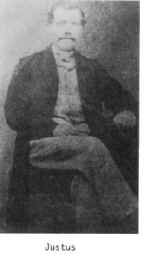 Seventeen children were born to Emma and Gus. Gus delivered all of them. He
was assisted by Mayme after she became old enough to help. Sixteen of the
children survived to become adults, Dehlia, the seventeenth child, died of
diphtheria at the age of five.
Seventeen children were born to Emma and Gus. Gus delivered all of them. He
was assisted by Mayme after she became old enough to help. Sixteen of the
children survived to become adults, Dehlia, the seventeenth child, died of
diphtheria at the age of five.
Emma and Gus farmed for nineteen years on a farm northeast of Norway and then
moved to land northeast of Blairstown. They lived on this farm twenty-five
years. Gus was a member of the Benton County Board of Supervisors from 1887 to
1893.
Pioneer spirit and the desire to help provide farms for his nine sons led Gus to sell his Benton County land and move to Beadle County, South Dakota, where he and his sons purchased 3,000 acres of land. Most of his children also located in the area. His son, Martin, became a member of the South Dakota legislature. When the depression hit the area, family members began returning to Benton County, Iowa. Gus and Emma returned to Blairstown in 1930.
Gus was a law-abiding citizen. While serving on the Benton County Board of Supervisors, he is credited with discovering a financial scandal and helping to send the offenders to prison. When prohibition became law, he immediately refused any liquor. He never drank again.
He predicted he would die on his ninety-second birthday - and he did. He had planned his funeral and made all the arrangements. His wife, Emma aged 86, died two months later. She was tired and it wasn't much fun living without him.
ANTIETAM REVISITED
by Jim Kimm
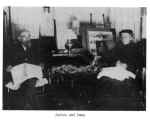 Some Kimm had to go back there, Someone who loved him had to go to Sharpsburg
and retrace his steps and honor him. We went there three times. We also went to
Fredricksburg and Fair Oaks. But Antietam was the most impressive to us because
that's the one he'd talked about when I was so little. Years later, I told them
I'd as soon be in the infantry cause that's where he'd fought.
Some Kimm had to go back there, Someone who loved him had to go to Sharpsburg
and retrace his steps and honor him. We went there three times. We also went to
Fredricksburg and Fair Oaks. But Antietam was the most impressive to us because
that's the one he'd talked about when I was so little. Years later, I told them
I'd as soon be in the infantry cause that's where he'd fought.
Our first impression at Antietam was the beauty of the land. There was grass and timber and corn and stillness. There was absolutely no sound there at Antietam, the cannons were silent and cold.
As we walked we realized that Justus had, on September 17, 1862, been involved in the bloodiest single day battle in the history of mankind. On that day, 26,000 men were killed or wounded. He lived.
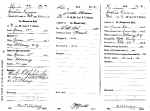 I didn't know until a year or so ago that the government has battle maps of
every major battle in our history. We looked at those maps for Fredericksburg
and Antietam. These maps show the movements of the 34th during both battles. At
Antietam, the maps showed the "doublequick" advance of the 34th New
York, which was back at Keedysville, Maryland. They moved up in unbelievable
time (45 minutes) and engaged the enemy. He shot a sniper at Dunker Church.
After the first hour there is no record of Company G. I asked the lady ranger
about this and she advised me, that as an infantryman, I should know better.
They were out of contact, but Justus lived.
I didn't know until a year or so ago that the government has battle maps of
every major battle in our history. We looked at those maps for Fredericksburg
and Antietam. These maps show the movements of the 34th during both battles. At
Antietam, the maps showed the "doublequick" advance of the 34th New
York, which was back at Keedysville, Maryland. They moved up in unbelievable
time (45 minutes) and engaged the enemy. He shot a sniper at Dunker Church.
After the first hour there is no record of Company G. I asked the lady ranger
about this and she advised me, that as an infantryman, I should know better.
They were out of contact, but Justus lived.
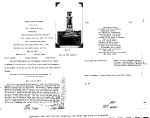 We've been to almost all of the Civil War battlefields. I reckon we'll be
going to the rest of them, God willing, and that we'll certainly go back to
Antietam.
We've been to almost all of the Civil War battlefields. I reckon we'll be
going to the rest of them, God willing, and that we'll certainly go back to
Antietam.
Aunt Hilda (John's wife) told me about life with the Justus H. Kimm.
-Berenice Delia Kimm Kanke
Grandfather Kimm was a Democrat until 1887 when he turned Republican and became a Benton County Supervisor.
 Grandmother's eyes were grey; she had pierced ears but never wore earrings.
Grandmother's eyes were grey; she had pierced ears but never wore earrings.
Grandmother used to sit in her rocking chair and piece quilts by hand. She sat up nights patching mittens in corn husking time.
They washed on the board - Laura rubbed on a board in one tub, Mayme on another.
They (the girls) all helped with the cooking. In husking time butchered a hog every two weeks. After the girls were married and gone, Arthur helped his mother with the cooking.
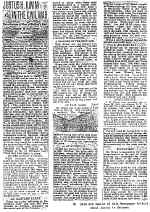 Grandfather delivered all of the seventeen babies; Mayme, the oldest
daughter, helped as she got older.
Grandfather delivered all of the seventeen babies; Mayme, the oldest
daughter, helped as she got older.
One time the boys were playing in the farm yard shooting sling shots. Gus accidently shot a calf and killed it. The brothers carried him around on their shoulders because they would have veal - otherwise they had fat pork mostly.
When Grandpa and Grandma went to Blairstown in the horse-hitched buggy, the kids got all the cats rounded up under the porch, then called the dogs. What a fight!
A bridge nearby was a place to hide under and jump out to scare the horses drawing wagons and buggies - also frightening the drivers.
Again, the slingshots were brought out and one of the boys shot through a window hitting the newspaper out of Grandpa's hands. Grandma reminded our angry Grandpa if he had been out working and busy he would not have been hit. No brother would admit to the shot.
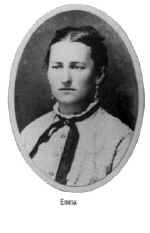 Grandpa had gone to Wolsey, sold some produce, came home and tossed the paper
money in Grandma's lap. She was busy sewing and scraps had accumulated in her
large lap apron. Absentmindedly, she went over to the heating stove, opened the
door, and tossed the contents of her apron into the fire. Suddenly she realized
she had thrown in the money as well. They sent the ashes to Washington D.C. and
recovered the amount.
Grandpa had gone to Wolsey, sold some produce, came home and tossed the paper
money in Grandma's lap. She was busy sewing and scraps had accumulated in her
large lap apron. Absentmindedly, she went over to the heating stove, opened the
door, and tossed the contents of her apron into the fire. Suddenly she realized
she had thrown in the money as well. They sent the ashes to Washington D.C. and
recovered the amount.
One day Grandfather went to Wolsey, drank a little too much, and the horse obligingly took him home. Horses could do this back in those days, they knew the way home. He rapped on the door in his lost confusion. He said to Grandma when she opened the door, "Lady, can you tell me where Justus Kimm lives"? Grandma answered, "You old fool - get in here!"
I can remember Grandpa coming to visit us in Blairstown in his older years
and he had a long beard. He chewed tobacco and the juice would run down the
beard, making a brown mess in the beard. Always I had to give Grandpa a kiss and
how I hated to. We had to have a spittoon so he could spit.
I Remember.....
by Jim Kimm
Justus
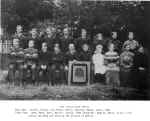 Sometimes, I almost wish I had been born sooner. He had a ton of wisdom
within him.
Sometimes, I almost wish I had been born sooner. He had a ton of wisdom
within him.
It was 1930 and the wind blew hot on the corn that Dad had planted. And the older you were the more hope you had. Except when you were ninety and knew that the corn would fire again and that you needed to get back to somewhere besides this place. And I sat on his lap that spring. He said, "You are my youngest grandson and I will expect something special of you."
And he told me of Antietam and Fredericksburg and how he served. He told me of things that I could not conceive. He told me of death and Dunker Church and how he fought. He told me of winning and losing at Fredericksburg. For nearly 50 years I wondered about these things, and then Dotti and I went to those places. And there, we found that he had told the truth.
 The church was there, everything was just as history says it was. He was
there - just as he said he was. Justus Kimm lived through the most horrible war
this nation has known. He fought at the front lines. He didn't hang back. He was
a hero.
The church was there, everything was just as history says it was. He was
there - just as he said he was. Justus Kimm lived through the most horrible war
this nation has known. He fought at the front lines. He didn't hang back. He was
a hero.
 At five years of age I didn't think he'd ever be gone. And he didn't ever go.
He's been with me for more than 50 years - in battle, in sickness, in success,
and in failure. His bluntness and his gentleness have not ever been forgotten.
His life and the way he lived it will be an inspiration for generations.
At five years of age I didn't think he'd ever be gone. And he didn't ever go.
He's been with me for more than 50 years - in battle, in sickness, in success,
and in failure. His bluntness and his gentleness have not ever been forgotten.
His life and the way he lived it will be an inspiration for generations.
Emma
 My Mom really loved her. They talked a lot in South Dakota. Grandma really
babied me. In the afternoons I'd go over there and I'd sit on her lap in the
rocking chair and she'd sing, very softly, some stuff I couldn't understand and
I'd take my nap. I loved the way her hands were. Her hands weren't old like the
rest of her. I really missed her when they went back to Iowa.
My Mom really loved her. They talked a lot in South Dakota. Grandma really
babied me. In the afternoons I'd go over there and I'd sit on her lap in the
rocking chair and she'd sing, very softly, some stuff I couldn't understand and
I'd take my nap. I loved the way her hands were. Her hands weren't old like the
rest of her. I really missed her when they went back to Iowa.
When we go to the graveyard at Watkins, I always walk up to her grave first -I know that Dad doesn't mind that. In times of need or when I'm hurting, I exit and drive over there. It's a peaceful place and it's one of the few times that I can be by myself. It's a nice place to go.
Arthur, My Dad
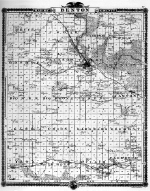 It was September, 1932, and we were ready to leave for Iowa. School was
started and I wasn't in it and here I was almost seven already and I worried
about if I'd ever be allowed in a school. The sale was over and the farm was
lost and I was so worried about getting to Iowa so they wouldn't set me back a
grade. But he hung around touching things and I could see he hated to leave. I
wondered why he didn't want to go to a new place until I stopped to think about
all those white face cattle and that I wouldn't ever see Major and Mousie again
and have old Maje teach me to plow and nuzzle my hand and show me how he could
pull that stone boat. Dad told me that you don't ever cry except when it's
absolutely necessary like when Vance ran that bit through my finger.
It was September, 1932, and we were ready to leave for Iowa. School was
started and I wasn't in it and here I was almost seven already and I worried
about if I'd ever be allowed in a school. The sale was over and the farm was
lost and I was so worried about getting to Iowa so they wouldn't set me back a
grade. But he hung around touching things and I could see he hated to leave. I
wondered why he didn't want to go to a new place until I stopped to think about
all those white face cattle and that I wouldn't ever see Major and Mousie again
and have old Maje teach me to plow and nuzzle my hand and show me how he could
pull that stone boat. Dad told me that you don't ever cry except when it's
absolutely necessary like when Vance ran that bit through my finger.
Then that day he cried. But he didn't ever say anything bad about the land. It just seemed like he was crying about the land and how he'd hoped it'd produce but it didn't. Lots of times the four of us had walked out there and hoped the crops would be better. And then we left for Iowa.
Gus
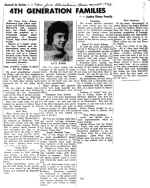 I remember Uncle Gus' store in the 1930s. I came busting into the store in
1938 and told Aunt Anna that Vander Meer had pitched his second no-hitter in a
row. I was really looking for Uncle Gus. She allowed I was just trying to get
some more candy and put it on our bill. But Uncle Gus came back and told her to
give me some candy free because Vander Meer had really pitched his second
no-hitter in a row. And Aunt Anna suggested that we change our names to Vander
Meer Senior and Vander Meer Junior. But Uncle Gus didn't want to cause it might
hurt his business having a new name. I wasn't all that excited because Kimm was
a lot simpler name than Vander Meer. Anyway, sometimes Aunt Anna gave me candy
even when there wasn't a no-hitter.
I remember Uncle Gus' store in the 1930s. I came busting into the store in
1938 and told Aunt Anna that Vander Meer had pitched his second no-hitter in a
row. I was really looking for Uncle Gus. She allowed I was just trying to get
some more candy and put it on our bill. But Uncle Gus came back and told her to
give me some candy free because Vander Meer had really pitched his second
no-hitter in a row. And Aunt Anna suggested that we change our names to Vander
Meer Senior and Vander Meer Junior. But Uncle Gus didn't want to cause it might
hurt his business having a new name. I wasn't all that excited because Kimm was
a lot simpler name than Vander Meer. Anyway, sometimes Aunt Anna gave me candy
even when there wasn't a no-hitter.
Uncle Gus gave many people credit at his store. At his funeral one of the pallbearers said, "I don't mind carrying Uncle Gus because he carried me for SO many years."
Charlie
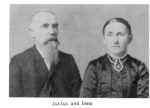 He was the boy who responded to Grandpa's plea from South Dakota. He was the
son who'd experienced the death of his wife in childbirth. He was the eldest son
of an immigrant's efforts to establish a foothold in a new world. He was a hard,
tough, driving German.
He was the boy who responded to Grandpa's plea from South Dakota. He was the
son who'd experienced the death of his wife in childbirth. He was the eldest son
of an immigrant's efforts to establish a foothold in a new world. He was a hard,
tough, driving German.
He married again to one of the most perfect of all girls. The writer had the privilege of visiting Mealie in a nursing home in 1961. She asked about my mother, as she always did. She was a wonderful lady. She asked me to come back again but she died before I did.
John
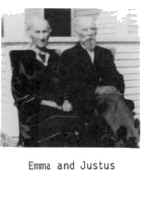 Dad said that John and Hilda were really serious about life and then Luverne
died and we went to the funeral in Huron. And I remembered her being SO pretty.
And Dad said, "I guess you can't be too unconcerned about these things
since it might be one of us." And then we started caring about each other
more.
Dad said that John and Hilda were really serious about life and then Luverne
died and we went to the funeral in Huron. And I remembered her being SO pretty.
And Dad said, "I guess you can't be too unconcerned about these things
since it might be one of us." And then we started caring about each other
more.
At Luverne's funeral, the Jim River stunk because it was a drought and the packing house was down there. But at the grave he put his arm around me and I hardly noticed the smell. And all the time the preacher talked, I remembered how pretty Luverne was. I felt sorry for Aunt Hilda. She was so pretty too.
Henry
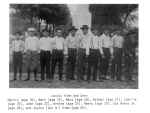 Uncle Henry and Aunt Lit lived down there close to Thunder Creek. I walked to
school by there from the old Groff place. I was in 7th and 8th grades and it was
in the late thirties.
Uncle Henry and Aunt Lit lived down there close to Thunder Creek. I walked to
school by there from the old Groff place. I was in 7th and 8th grades and it was
in the late thirties.
Uncle Henry had a great gift. No matter who went by he could talk to them. I'd stop to talk to him and we'd talk about a lot of things. Like hoops. Or rabbits. Or Diamond T trucks. Or why my big toe hurt. Or how far it was to Norway. He was a genius.
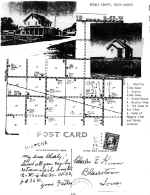 Uncle Henry always had an easy chair and I reckon he's sitting in it up
there. He sure was nice to a lot of Blairstown kids. I won't ever forget him.
Uncle Henry always had an easy chair and I reckon he's sitting in it up
there. He sure was nice to a lot of Blairstown kids. I won't ever forget him.
Archie
In 1932 we moved to the tenant house on Uncle Archie's farm across the road from the big house. That was just a little bit northeast of Blairstown. I really loved Uncle Archie. He always had time to talk to little kids. One day everybody was gone and I got to stay with Uncle Archie in the big house. Let me tell you about Uncle Archie; he was about the nicest guy and the poorest cook I've ever known. I was eight at the time and he and I cooked. He made gravy and it was really floury and terrible. He laughed about that for the rest of his life. It was positively the worst gravy I'd ever tried to eat.
At Uncle Archie's funeral somebody should have jumped up and said that he made bad gravy but that he was really a wonderful person. Hardly anyone knew about the gravy. The gravy wasn't really all that important.
Navigation: Home || Jacob Conrad || Leonhart || Henry || Silas || Justus || Jacob || Mary || Martin